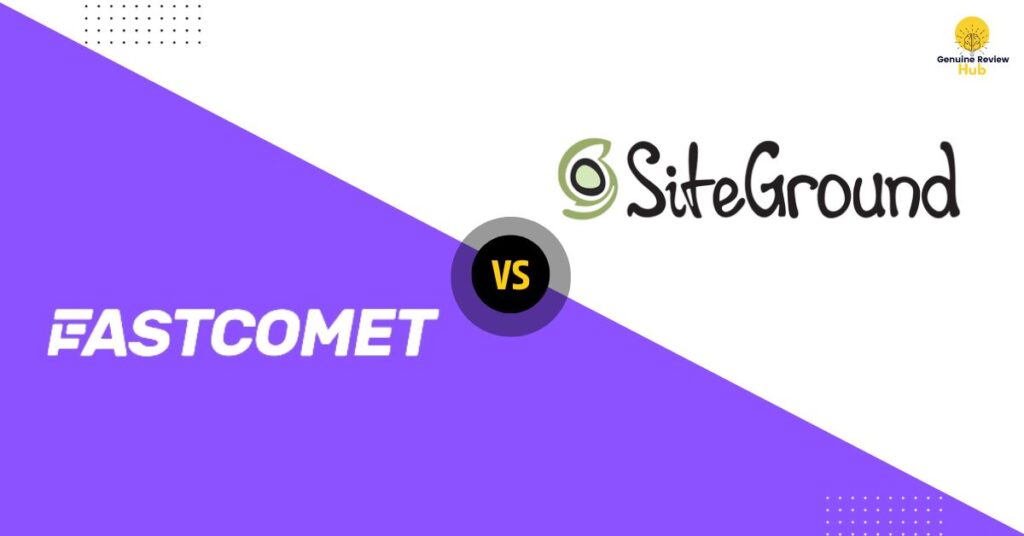In the battle between FastComet vs. SiteGround, both hosting providers exhibit commendable features, but they cater to different user needs.
- FastComet is ideal for those seeking a balanced package of performance, support, and convenience at competitive rates, especially for smaller or growing websites.
- SiteGround is better suited for users valuing top-tier performance, security, and global coverage, even if it comes at a slightly higher cost.
Ultimately, the choice between FastComet and SiteGround depends on specific priorities and the scale of your website needs.
For an in-depth analysis and detailed breakdown of the features, performance, pricing, and more, continue reading the comprehensive comparison below.
Table of Contents
FastComet vs. SiteGround: Pricing Comparison
FastComet Pricing:
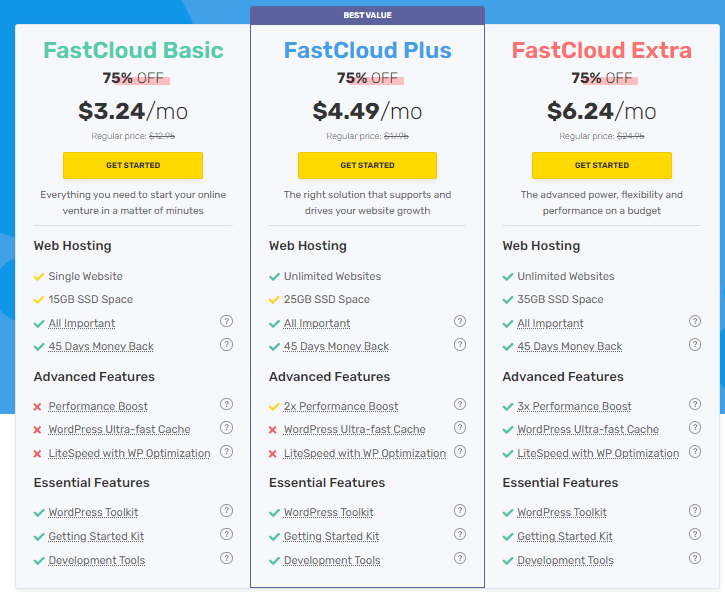
FastComet offers a range of hosting plans starting from $3.24 per month. Their shared hosting plans include “FastCloud,” “FastCloud Plus,” and “FastCloud Extra,” priced at $3.24/month, $4.49/month, and $6.24/month, respectively, for the initial term. The plans provide essential features like free domain registration, daily backups, SSL certificates, and a website builder. However, it’s important to note that the renewal prices can increase significantly, more than double the initial cost. Additionally, it offers a 45-day money-back guarantee, easing the initial commitment for users.
Click here to learn more about FastComet pricing and plans.
SiteGround Pricing:
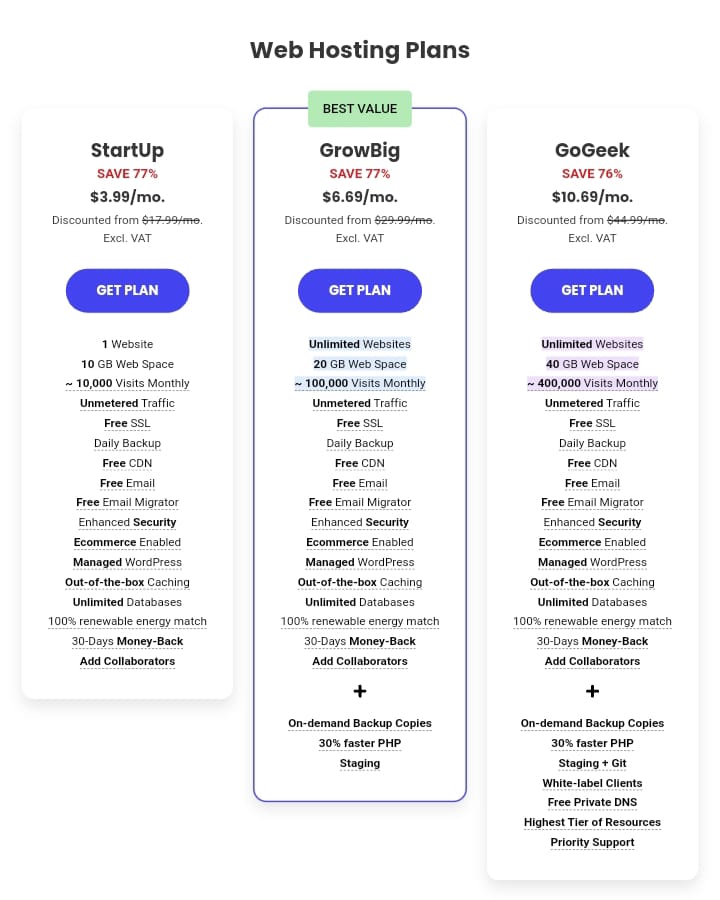
SiteGround’s pricing for shared hosting plans starts from $3.99 per month for the initial term. They have three shared hosting plans: “StartUp,” “GrowBig,” and “GoGeek.” The entry-level “StartUp” plan includes essential features like a free website builder, free SSL, daily backups, and unlimited traffic. SiteGround’s unique features encompass top-notch security and superb customer support.
However, one point to consider is that SiteGround’s renewal prices significantly increase after the initial term, almost doubling or even more, making it essential to plan for long-term costs.
Key Differences:
FastComet seems more cost-effective in the short term, offering lower initial prices for entry-level plans. However, SiteGround might be costlier initially, but it provides more comprehensive features and scalability.
Both providers have upsides and downsides in terms of pricing. FastComet offers competitive rates initially but may pose higher renewal costs, while SiteGround, although slightly pricier at the outset, might offer a more comprehensive suite of features and resources.
FastComet vs. SiteGround: Performance Comparison
FastComet Performance:
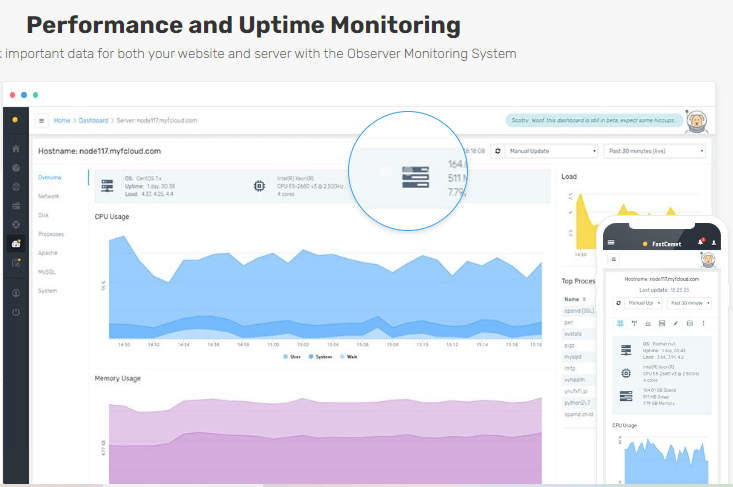
FastComet emphasizes a balanced approach to performance. Their hosting services leverage SSD storage, Cloudflare CDN, and LiteSpeed cache to ensure optimized loading times and overall website performance. FastComet’s hosting plans come with free Cloudflare CDN integration, enabling faster content delivery across global networks.
Moreover, FastComet’s server infrastructure is well-designed to handle traffic spikes efficiently, maintaining stable performance even during high-traffic periods. However, it’s important to note that FastComet’s server locations are relatively limited compared to SiteGround, which could slightly affect global loading speeds for some users.
Click here to learn more about FastComet Performance.
SiteGround Performance:
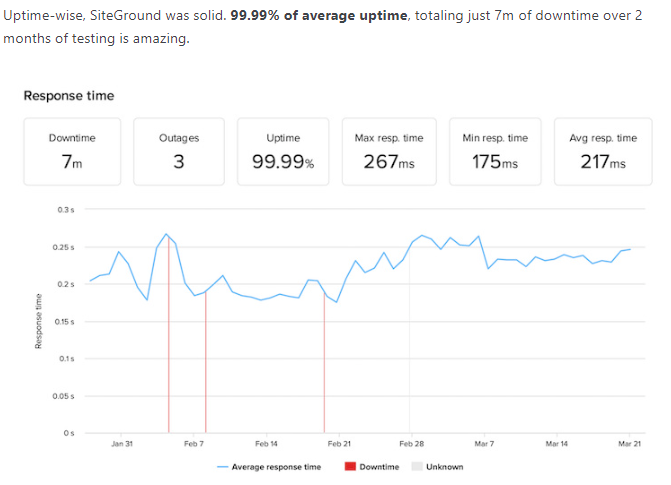
SiteGround is renowned for its exceptional performance. With a global network of data centers on multiple continents, SiteGround boasts impressive loading speeds and reliability. Their servers are optimized for speed, incorporating advanced caching mechanisms, SSD storage, and proactive server monitoring to ensure optimal performance.
Furthermore, SiteGround’s use of the latest technologies like NGINX servers, HTTP/2, and PHP7 significantly enhances website speed and performance. The presence of multiple data center locations around the world enables users to choose the server closest to their audience, reducing latency and optimizing loading times.
Key Differences:
While both FastComet and SiteGround prioritize website performance, SiteGround holds an advantage with its extensive global network of data centers. SiteGround’s multi-location servers contribute to faster loading times and enhanced user experience for a more geographically diverse audience.
FastComet, on the other hand, maintains a robust infrastructure and uses efficient technologies but might slightly lag in global loading speeds due to its more limited data center reach.
Ultimately, the choice between FastComet and SiteGround in terms of performance depends on the geographical distribution of your audience and the specific performance needs of your website.
FastComet vs. SiteGround: User-Friendliness Comparison
FastComet User-Friendliness:

FastComet prioritizes an intuitive and user-friendly experience. Their platform offers a straightforward and user-centric interface, making it easy for beginners to navigate. The control panel is based on cPanel, a widely used and intuitive control interface, providing users with a familiar environment to manage their hosting account, domains, and other services.
Furthermore, FastComet provides a user-friendly experience through its one-click installer, making it simple for users to install various applications and CMS platforms like WordPress or Joomla without technical complications. Their support documentation and customer service add to the overall ease of use, providing clear and helpful guidance for users at all levels.
SiteGround User-Friendliness:
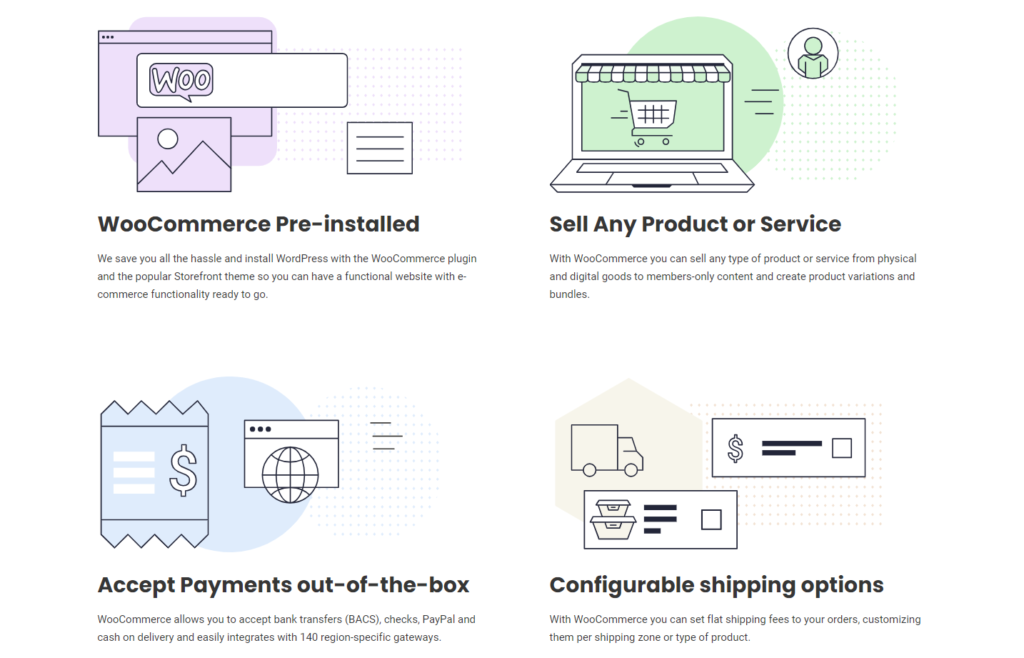
SiteGround is also known for its user-friendly approach. Their custom-designed interface is user-centric and easy to navigate, ensuring that users can easily manage their hosting account, domains, and other features. Although it might not be as widely familiar as cPanel, SiteGround’s control panel is intuitive and efficient.
One distinguishing feature is SiteGround’s onboarding process, which guides users through the initial setup and installation of various applications, helping beginners to start off smoothly. Their customer support is highly rated for its assistance and user guidance, further enhancing the user experience.
Key Differences:
Both FastComet and SiteGround excel in providing user-friendly interfaces and experiences. FastComet offers the familiarity of cPanel, which many users appreciate, while SiteGround’s custom panel ensures an intuitive experience, especially for beginners.
FastComet’s straightforward interface and documentation might appeal to those seeking simplicity, whereas SiteGround’s step-by-step guidance during onboarding can be advantageous for newcomers setting up their first website.
The choice between FastComet and SiteGround in terms of user-friendliness depends on your familiarity with control panels and your preference for guided onboarding.
FastComet vs. SiteGround: Security Comparison
FastComet Security:

FastComet places a strong emphasis on security across its hosting services. They provide various security measures such as free daily backups, SSL certificates, and a Web Application Firewall (WAF) to protect websites from potential threats. Additionally, FastComet’s servers are equipped with malware scanning and removal tools to ensure the integrity of hosted websites.
Furthermore, FastComet offers a free Cloudflare CDN integration, which not only enhances website performance but also includes DDoS protection, improving resilience against potential distributed denial-of-service attacks.
SiteGround Security:
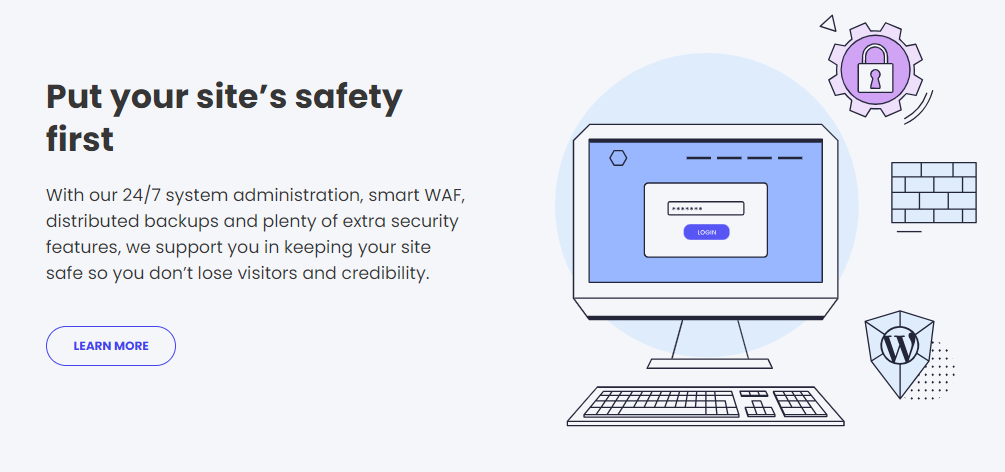
SiteGround is renowned for its robust security measures. They employ a proactive security approach, incorporating features such as a custom web application firewall (WAF), automated daily backups, and free SSL certificates. SiteGround’s WAF actively filters and monitors website traffic to block potential security threats and common hacking attempts.
Moreover, SiteGround’s unique account isolation feature ensures that shared hosting accounts are isolated from one another, adding an extra layer of security and reducing the risk of cross-account vulnerabilities.
Key Differences:
Both FastComet and SiteGround prioritize security in their hosting solutions. FastComet offers a comprehensive security suite with features like free backups, SSL, and a Web Application Firewall. Their integration with Cloudflare adds an extra layer of protection against DDoS attacks.
SiteGround’s proactive security measures, including a custom WAF and account isolation, provide a robust defense against various threats. The account isolation feature is especially noteworthy in enhancing security for shared hosting environments.
Choosing between FastComet and SiteGround in terms of security hinges on the specific security measures that align with your website’s needs and your priority for account isolation in a shared hosting environment.
FastComet vs. SiteGround: Pros and Cons
Pros of FastComet:
- Excellent Customer Support: FastComet is praised for its top-notch customer service, offering 24/7 support via multiple channels.
- All-in-One Solutions: They provide free domain registration, daily backups, SSL certificates, and a user-friendly interface.
- Competitive Pricing: Initial pricing is competitive, especially for the provided features and performance.
Cons of FastComet:
- Limited Data Centers: FastComet has fewer data center locations compared to SiteGround, potentially impacting global loading speeds for some users.
- Renewal Price Increase: After the initial term, renewal prices can significantly rise, affecting long-term budget planning.
- Possible Upselling Tactics: There have been reports of aggressive upselling tactics beyond the initial term.
Pros of SiteGround:
- Diverse Data Center Locations: SiteGround’s extensive network of data centers ensures excellent global coverage, catering to diverse audiences.
- Robust Security Features: SiteGround offers advanced security measures, including a custom WAF, automated backups, and free SSL certificates.
- Top-Tier Speed and Reliability: Known for exceptional speed and reliability, backed by advanced technologies and server optimizations.
Cons of SiteGround:
- Higher Renewal Prices: Similar to FastComet, SiteGround’s renewal prices significantly increase after the initial term, potentially straining long-term budgets.
- Limited Resources on Entry-Level Plans: The basic plans might offer fewer resources, potentially limiting scalability for growing websites.
- Control Panel Unfamiliarity: The custom control panel, while intuitive, might be less familiar to users accustomed to cPanel.
Key Differences:
FastComet excels in competitive pricing, exceptional customer support, and comprehensive solutions but may lag in data center distribution and renewal cost management. SiteGround shines in global coverage, robust security, and top-tier speed but might pose challenges with higher renewal prices and potential resource limitations on basic plans.
Choosing between FastComet and SiteGround depends on individual priorities, such as budget, global audience reach, and the specific requirements of a website in terms of speed, security, and scalability.
FastComet vs. SiteGround: Summary
Here’s a simplified table outlining the key features and aspects of FastComet and SiteGround for a quick comparison:
| Features | FastComet | SiteGround |
|---|---|---|
| Pricing | Competitive initial pricing; | Slightly higher initial pricing; |
| potential significant renewal increase | higher renewal costs after the | |
| after the initial term. | initial term. | |
| Performance | Well-rounded performance, limited | Exceptional speed, reliability, |
| data center locations. | diverse data center locations. | |
| User-Friendliness | Intuitive cPanel-based interface, | Custom-designed user-friendly |
| straightforward. | interface, helpful onboarding. | |
| Security | Strong security with daily backups, | Robust security with custom WAF, |
| SSL, and Cloudflare integration. | automated backups, and SSL. | |
| Support | Excellent 24/7 customer support | Quality customer support with |
| across multiple channels. | varied support options. | |
| Pros | – All-in-one solutions | – Diverse data center locations |
| – Competitive pricing initially | – Robust security measures | |
| – Excellent customer support | – Top-tier speed and reliability | |
| Cons | – Limited data center locations | – Higher renewal prices |
| – Potential renewal cost increase | – Limited resources on entry-level | |
| – Possible upselling tactics | plans |
- Customer Support: FastComet boasts excellent customer service, offering 24/7 support through various channels. This dedicated assistance contributes to a smoother user experience and prompt issue resolution.
- All-Inclusive Solutions: FastComet provides a comprehensive package with free domain registration, daily backups, SSL certificates, and a user-friendly interface, streamlining the setup and management process for users.
- Competitive Pricing: Initially, FastComet offers competitive pricing, delivering essential features and solid performance at budget-friendly rates. However, it’s essential to note the potential for increased renewal prices after the initial term.
While both providers have their strengths, FastComet stands out due to its well-rounded approach, offering a balance between cost-effectiveness, inclusive features, and reliable customer support. The competitive pricing and comprehensive solutions make it an attractive option, particularly for smaller or growing websites looking for a user-friendly, all-in-one hosting solution.
It’s important to note that individual preferences and specific website requirements will ultimately dictate the best choice. However, for those valuing a blend of affordability, all-inclusive solutions, and responsive support, FastComet presents itself as a preferred option in the FastComet vs. SiteGround comparison.

